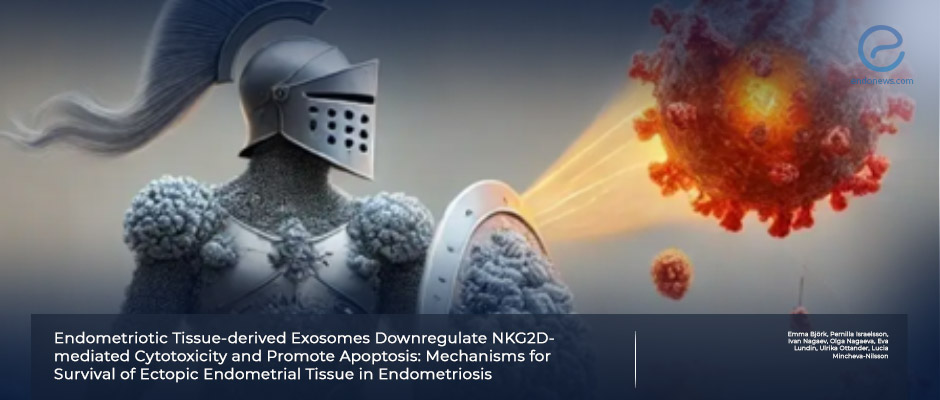Endometriotic Exosomes Suppress Immune Defense and Promote Ectopic Tissue Survival
Dec 6, 2024
Immune Evasion and Apoptosis via Endometriotic Exosomes Exosome-Mediated Immune Evasion in Endometriosis: A Mechanistic Insight into Immune Dysfunction
Key Points
Highlight:
- Endometriotic tissue-derived exosomes suppress immune surveillance by impairing NK-cell cytotoxicity through NKG2D ligand interactions and inducing apoptosis in activated immune cells.
- These findings uncover a novel mechanism of immune evasion in endometriosis, offering diagnostic and therapeutic insights.
Importance:
- This study uncovers a novel mechanism by which endometriotic lesions evade immune clearance through exosome-mediated suppression of NK-cell activity, providing valuable insights into the pathogenesis of endometriosis.
What’s done here?
- This study primarily evaluated the immune effects of exosomes secreted by endometriotic tissue.
- Isolated exosomes via short-term explant cultures and sucrose gradient ultracentrifugation.
- Characterized exosomes using electron microscopy, immunoflow cytometry, and functional assays to assess their effects on immune cells.
Key results
- Immune Suppression: Exosomes from endometriotic tissue downregulate NKG2D receptor expression on peripheral blood mononuclear cells, impairing NK-cell cytotoxicity.
- Proapoptotic Effects: Exosomes carry NKG2D ligands (MICA/B, ULBP1-3) and proapoptotic molecules (FasL, TRAIL), inducing apoptosis in activated immune cells.
- Immune Privilege: This creates a protective, "immune-privileged" environment around endometriotic lesions, shielding them from immune attack.
Limitations
- The limited sample size, due to the challenge of obtaining hormonally untreated severe endometriosis cases from a sparsely populated region, may restrict generalizability.
Lay Summary
In a study published in the Journal of Immunology, Björk et. al investigated how NKG2D-mediated cytotoxicity affects the function of endometrios cells enviroment in endometriosis, highlighting its role in disease progression and its potential as a target for therapeutic intervention.
This study explores the role of exosomes secreted by endometriotic tissue in impairing immune surveillance, providing a novel mechanistic insight into the pathogenesis of endometriosis.
The research focuses on two key immunosuppressive pathways mediated by these exosomes:
- Downregulation of the NKG2D receptor on natural killer (NK) cells.
- Induction of apoptosis in activated immune cells through FasL and TRAIL ligands.
Results revealed that endometriotic tissue-derived exosomes carry immunosuppressive molecules, including NKG2D ligands (MICA/B, ULBP1-3) and proapoptotic ligands (FasL, TRAIL). These exosomes downregulated the NKG2D receptor on NK cells and impaired their cytotoxic function. Additionally, the exosomes triggered apoptosis in activated immune cells, forming a protective immunosuppressive gradient around endometriotic lesions.
This "immune shield" mechanism allows ectopic endometriotic tissue to escape immune clearance and persist, offering a plausible explanation for the immune dysfunction observed in endometriosis patients. These findings not only shed light on the pathophysiology of endometriosis but also highlight potential therapeutic implications of targeting exosomal pathways in managing this enigmatic disease.
Research Source: https://pubmed.ncbi.nlm.nih.gov/38984872/
endometriosis NK Cell immune defence FasL

